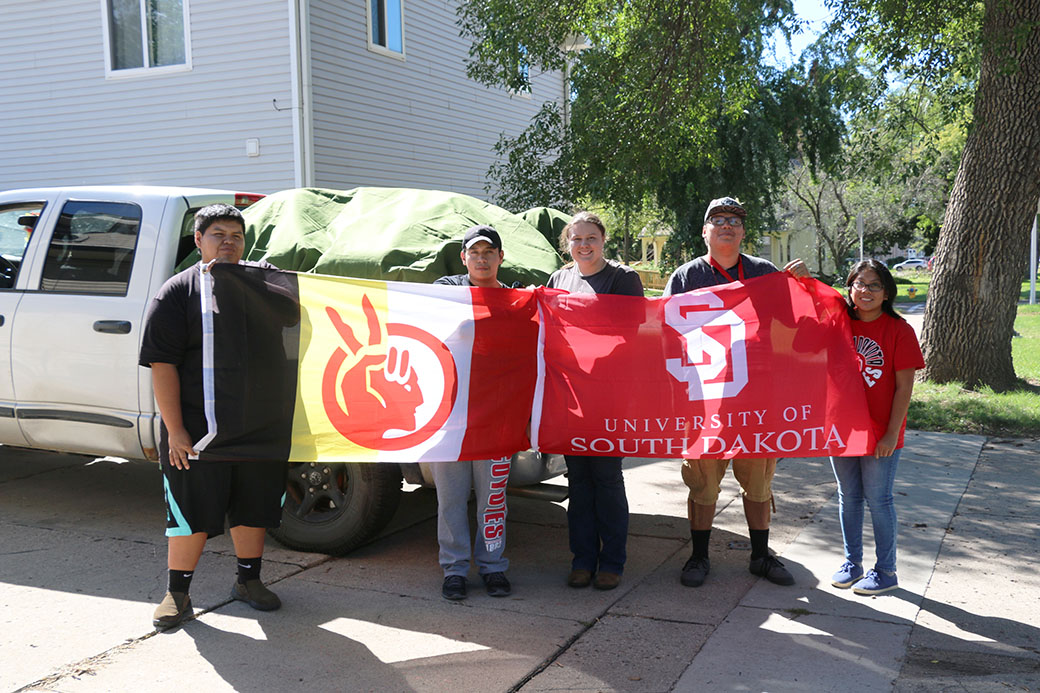
USD collects supplies, raises awareness for DAPL
Students and faculty around the University of South Dakota’s campus have joined the protest of the Dakota Access Pipeline, a $3.78 billion production that will transport about 570,000 barrels of crude oil from Bakken, North Dakota, through South Dakota, Iowa and Patoka, Illinois. Tribes across the nation have come together to protest the pipeline’s passing through sacred sites and the threat of damaging water supplies near the Standing Rock Sioux Reservation near Cannon Ball, North Dakota.
Donation Drive
USD students from the Native American Cultural Center collected donations and traveled to Standing Rock on Friday to deliver them. Supplies they had were feminine hygiene products, winter clothing, blankets, non-perishable foods, school supplies for children, sleeping bags and camping gear.

The NACC collected items for about three weeks before they traveled up to Standing Rock, which was “enough to fill a small Uhaul,” said first-year Ingrid Cho.
The NACC students who organized the donation drive, junior Jessi Bean, first-year Mickayla Armell and Cho, said they were motivated to collect supplies after taking a photo with the law students.
“As Native students, we did a lot of support — we took a picture with the law students, but we wanted to do something more,” Bean said.
The NACC was ready to begin their efforts to raising awareness through the donations, and also reflect on their personal feelings regarding the pipeline and how it affects everyone, and how it’s not “just a Native issue,” according to Bean.
“It’s important to us because that’s basically our family up there standing for what they believe in is right to protect their land,” Armell said. “It’s a necessary concern that something could happen.”
Cho said they had lots of help from other students at the NACC and faculty and staff members who have helped spread the word about collecting and donating supplies. Cho also said Native Studies director Gene Thin Elk and the center’s program coordinator Donis Drappeau helped a lot with getting the word out across campus.
“It’s a heartwarming feeling to watch that grow since Monday (Sept. 12),” Armell said. “We really didn’t have that much, and it’s nice that people are willing to help take something up there to show that we as students understand and are here to help as much as we can, even if it’s just something like this.”
Cho said that bringing awareness to the pipeline and the potential damages it could cause is imperative.
“The students here need to be aware of what’s happening,” Cho said. “Our school would be affected since we’re just so close to the river and they just need to be informed.”
When delivering the supplies to the sacred stone camps at Standing Rock, the group wished to also shed light on the fact that though the supporters are protecting the sacred grounds and shouldn’t only be referred to as protestors.
“We’re standing up for our water, our rights,” Bean said. “We’re really excited to be part of something — this is a big, historical thing that’s happening right now. This is the first time in 100 years that all seven Sioux tribes have been together. Historically rival tribes are coming together to unite for one purpose. It’s a monumental, historic event and we get to be part of it. It’s a big community and everyone’s family up there.”
The group is “thankful” for all the supplies that they were able to collect over the past few weeks, and hopes to continue to bring awareness to the pipeline, even if people don’t donate.
“I don’t think we could have gotten that amount of stuff we have if we hadn’t gotten the word out as much as it has,” Armell said.”Student-wise, the students that have helped mean a lot, but it would be nice if others were aware of the problem.”
Yankton protests

Upon collecting supplies for the Standing Rock protests, there were also two rallies in Yankton over the weekend that brought community members together. The first rally, a 12-hour standing protest near the Meridian Bridge Plaza, drew in more than 30 people.
Pat Grant, an organizer of the protest on Saturday in Yankton, said she was “overwhelmed by all the news I heard from the Standing Rock tribe.”
“When I think back over the years of what the Native people have gone through, I just thought, ‘This has got to stop,'” Grant said. “I just wanted to do something to support Standing Rock.
First-year student Katie Lacroix attended both protests in Yankton because, “it’s the closest I get to supporting Standing Rock.”
“I feel like the whole situation has been going on for so long,” Lacroix said. “It’s cool that all these tribes can come together without violence.”
Native American Law Students Association
The Native American Law Students Association has also been part of educating and showing support for the Standing Rock Sioux Tribe in North Dakota through their event at the courtroom at the law school. There, the group “demonstrated solidarity with Standing Rock,” said Frank Pommersheim, NALSA adviser and professor of law. The group and other supporters had a photo opp with a banner that read “Standing With Standing Rock.”
“I think NALSA’s position is that this is a very important issue affecting, certainly tribes in the state, but as well as nationally,” Pommersheim said. “It’s important for a student group here at the law school to take a position of solidarity that will make people at Standing Rock aware that a law student group here appreciates their efforts.”
Besides the photo to show support, NALSA also helped spread the word about donations to the NACC.
Pommersheim, who is teaching Indian law this semester, touched on the DAPL topic in his classes.
“It kind of fits together with some of the issues with talk about in class in terms of water rights, treaty rights in some very complicated, legal issues,” Pommersheim said. “From a teaching point of view, it’s often, sometimes, good if you can link what you’re teaching in class to what’s happening in the real world. This particular issue is a very good pedagogical device to use.”
NALSA is helping to show support for the Standing Rock Sioux Tribe by letting students know that they, too, have a voice in the issues across the nation.
“I think it’s important for students, as NALSA does, to remember that they’re all citizens,” Pommersheim said. “I think it’s part of their civic and student responsibility to enhance awareness of those issues. Better citizens make better lawyers, and better lawyers make better citizens.”


